 Pets in Space 5 by Alexis Glynn Latner, Carol Van Natta, Cassandra Chandler, J.C. Hay, Kyndra Hatch, Laurie A. Green, Leslie Chase, Michelle Diener, Pauline Baird Jones, Regine Abel, S.E. Smith, Veronica Scott
Pets in Space 5 by Alexis Glynn Latner, Carol Van Natta, Cassandra Chandler, J.C. Hay, Kyndra Hatch, Laurie A. Green, Leslie Chase, Michelle Diener, Pauline Baird Jones, Regine Abel, S.E. Smith, Veronica Scott Format: eARC
Source: author
Formats available: ebook
Genres: science fiction, science fiction romance, space opera
Series: Pets in Space #5
Pages: 1505
Published by Cats, Dogs and Other Worldly Creatures on October 6, 2020
Purchasing Info: Author's Website, Publisher's Website, Amazon, Barnes & Noble, Kobo
Goodreads
Are you ready? Pets in Space® 5 is back for the fifth amazing year! Twelve of today’s top Science Fiction Romance authors have written 12 original, never-before-released stories filled with action, adventure, suspense, humor, and romance that will take you out of this world. The giving doesn’t stop there. For the fifth year, Pets in Space® will be donating a portion of the first month proceeds to Hero-Dogs.org, a non-profit charity that supports our veterans and First Responders. Pets in Space® has donated over $15,000 in the past four years. Together, we can make a difference! Grab your copy today!
The Stories
The King's Quest
A Dragon Lords of Valdier Short Story
by S.E. Smith
A playful trick leads to love for a Goddess, but will the King she falls in love with accept her for who she really is?Dark Ambitions
A Class 5 Novella
by Michelle Diener
When a planetary exploration trip takes a dangerous turn, a human woman and her powerful AI friend will need all their skills to come to the rescue.Star Cruise: Return Voyage
The Sectors SF Romance Series
By Veronica Scott
She survived the worst interstellar shipping disaster in history as a child but can she survive the RETURN VOYAGE as an adult?General's Holiday
Project Enterprise Series Story
By Pauline Baird Jones
A General wanting an adventure gets more than he bargains for when a lady with a pet frog asks for help.Juggernaut
The Inherited Stars Series
By Laurie A. Green
When a top-secret site is threatened, a security commander must decide if she can trust a mysterious stranger and his bioengineered StarDog to help her root out a dangerous spy.Galactic Search and Rescue
Central Galactic Concordance Series
By Carol Van Natta
A disaster threatening an entire town. An underfunded rescue team with unusual animal helpers. Can two first-responders save the day and find love?Reaper
Xian Warriors Series
By Regine Abel
With time running out, a woman accepts her fate only to find hope in the genetically engineered warrior created by her captors.Pastfinders
Starways Series
By Alexis Glynn Latner
When a beautiful archaeologist and a principled biologist fall in love amid alien ruins, her psychic gift for luck leads to a startling discovery and the recovered memory of a trauma upends his life. Finding the past can forever change the future...Mittens Not Included
TriSystems: Smugglers Series
By JC Hay
He craved order and discipline to help his life make sense. She offered him cats instead.Finding Mogha
Before The Fall Series
By Kyndra Hatch
Could the sound of a voice ignite a soul-deep passion in a sworn enemy?Rate of Return
The Department of Homeworld Security
By Cassandra Chandler
When an alien shapeshifter suddenly appears in her backyard, a pet parlor owner is far from terrified!Glitch
Crashland Colony Romance Series
by Leslie Chase
When it comes to love, some promises are meant to be broken...
My Review:
Welcome to Pets in Space, the annual single-volume binge-read of science fiction romance! And what a yummy smorgasbord of delicious SFR delights it is.
In all seriousness, this collection qualifies as the kind of huge, bug-eyed monster that so often appears as the villain in SF. Not for its monstrousness – because it’s not that – but simply for its incredible size.
This year’s collection of space-worthy companion animals weighs in at around 1500 pages (Amazon and Kobo give slightly different numbers). And that’s more than enough to be a binge read all by itself.
Because these aren’t short stories. These are novellas, every single one. A bounteous dozen epic stories.
This is a collection I look forward to every year, and this year was no exception. But because of its sheer size, I never manage to read the whole thing on the first pass. Instead, I have a plan of attack.
First the stories that are set in universes I’m already familiar with. Then any remaining stories that feature felines – because my own house tigers and house panther expect nothing less. Later, I get to the ones where I just know I’ll be tempted to add to my towering TBR pile with worlds I have yet to explore.
Be advised that this collection is guaranteed to make your TBR pile grow – possibly exponentially. There’s always so many fascinating worlds to explore.
But this year, my first pass at the marvelous mass led me to four stories before I needed a bit of time to digest. Those four were Star Cruise: Return Voyage by Veronica Scott, General’s Holiday by Pauline Baird Jones, Juggernaut by Laurie A. Green and Pastfinders by Alexis Glynn Latner.
 I think there has been a Star Cruise story in every Pets in Space collection, and they’ve always been among my favorites. This year’s entry, Star Cruise: Return Voyage, was particularly poignant, as it also hearkened back to the marvelous prequel for the enter Sectors SF series, The Wreck of the Nebula Dream. Not that I think you HAVE to have read it or any of the other previous books in this marvelous series. The concept of a cruise ship in space is a wonderful shortcut to adapting a new reader to this universe, as we all have a concept of what that might be.
I think there has been a Star Cruise story in every Pets in Space collection, and they’ve always been among my favorites. This year’s entry, Star Cruise: Return Voyage, was particularly poignant, as it also hearkened back to the marvelous prequel for the enter Sectors SF series, The Wreck of the Nebula Dream. Not that I think you HAVE to have read it or any of the other previous books in this marvelous series. The concept of a cruise ship in space is a wonderful shortcut to adapting a new reader to this universe, as we all have a concept of what that might be.
This story was particularly good as it brought one of the survivors of the Nebula Dream – itself a Titanic analog – to face her fears and embrace her hopes on a sister ship of the one that took her mother and changed her life. That her PTSD from the disaster is able to finally begin true healing with the help of her support animal, a military vet suffering his own version of the same, and a gang of ruthless kidnappers made this a fascinating story. (Yes, I know that almost doesn’t make sense – but it does. Read the story and see for yourself!)
There was a Star Dog story in the very first Pets in Space, so it’s great to see the tradition carried on by what seems like a prequel. The Star Dog in Juggernaut is one of the first, and she’s on one of her first missions with her human partner. They’re both being tested, for compatibility and effectiveness. And the test goes completely off the rails when her human discovers someone that he wants to bond with, in the middle of a deadly spy game. He knows that he should stay out of it, but he can’t let her go. Even knowing that they can’t stay together in the long run. Unless they can after all.
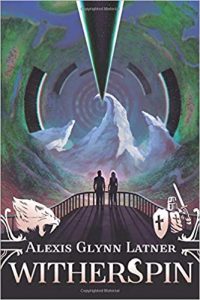 I read Pastfinders not because I’ve been in this world before, but because I’ve loved every single one of this author’s previous entries in the collection. I figured that this would be no exception – and I was so right. This one combines xenoarchaeology with the discovery of a past that the powers-that-be want to bury at all costs – along with anyone who might know the truth. It takes the combined skullduggery of an entire crew of xenoarchaeologists, researchers and ex-military operators to save the truth from onrushing floodwaters. The way that this crew operated reminded me a bit of Jodi Taylor’s Chronicles of St. Mary’s. I’m not sure why, but it did, and in a good way that makes me want to go back to that series AND read the first book the author has released in the Pastfinders universe, Witherspin.
I read Pastfinders not because I’ve been in this world before, but because I’ve loved every single one of this author’s previous entries in the collection. I figured that this would be no exception – and I was so right. This one combines xenoarchaeology with the discovery of a past that the powers-that-be want to bury at all costs – along with anyone who might know the truth. It takes the combined skullduggery of an entire crew of xenoarchaeologists, researchers and ex-military operators to save the truth from onrushing floodwaters. The way that this crew operated reminded me a bit of Jodi Taylor’s Chronicles of St. Mary’s. I’m not sure why, but it did, and in a good way that makes me want to go back to that series AND read the first book the author has released in the Pastfinders universe, Witherspin.
Last, but very definitely not least, my favorite story so far, Pauline Baird Jones’ General’s Holiday. Some of that favoritism has to do with the main character’s frequent and sometimes lighthearted but most often slightly rueful references to Star Trek. As many times as General John Halliwell refers to this particular mission as his “Picard moment”, one wonders if the title of the story isn’t a direct homage to the Next Generation episode Captain’s Holiday, where Picard goes to Risa for a little quiet R&R and ends up in the middle of a questionable adventure in the company of a femme fatale with a rather elastic set of ethics. Not that he believes that Naxe’s motives are quite as dubious as Vash’ were, but it’s clear that she’s being evasive about something. She believes what she’s saying, which is not the same thing as telling the objective truth. It’s only when Halliwell is in the middle of that objective truth that he discovers just how far out there her story really is. It looks like his Picard moment of diplomacy is going to turn out to be a Kirk shootout after all.
Escape Rating A: As Mae West famously said, “Too much of a good thing can be wonderful!” and that’s certainly the case with Pets in Space 5. I loved all of the stories that I have read so far, and I have so many more to look forward to.
There’s so much to love in this collection that I’m going to have to pace myself. As much as I loved Pastfinders – and I definitely did – when I finished I hit a wall. I’m going to go find a reading palate cleanser or two – so that I can dive right back in. After all, I still have what looks like a marvelous cat story (Mittens Not Included) left to read, along with all of the rest of the yummy SFR goodness this collection has to offer.
I’m already looking forward to next year’s goodies!

 Hench by
Hench by 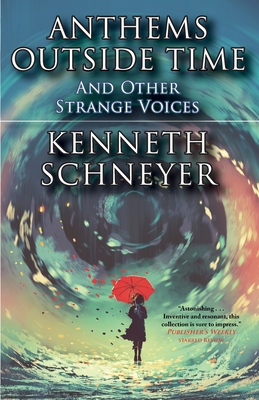 Anthems Outside Time and Other Strange Voices by
Anthems Outside Time and Other Strange Voices by 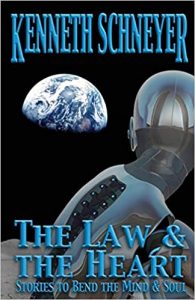 The stories in this collection, those Anthems Outside Time, are not fluffy bunnies. Most of them come from the darker corners of the imagination, and all of them are compellingly readable.
The stories in this collection, those Anthems Outside Time, are not fluffy bunnies. Most of them come from the darker corners of the imagination, and all of them are compellingly readable.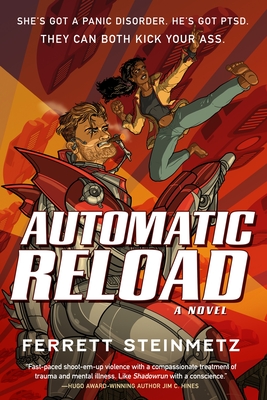 Automatic Reload by
Automatic Reload by 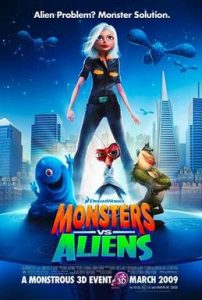 I’ll admit that I also kept seeing Silvia as the character in the movie
I’ll admit that I also kept seeing Silvia as the character in the movie 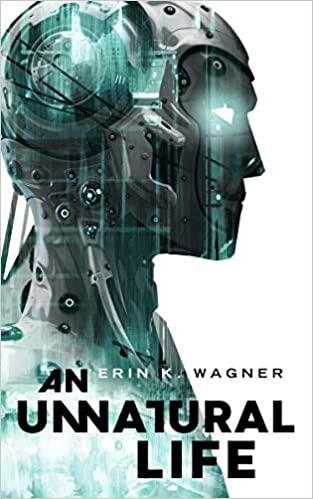 An Unnatural Life by
An Unnatural Life by 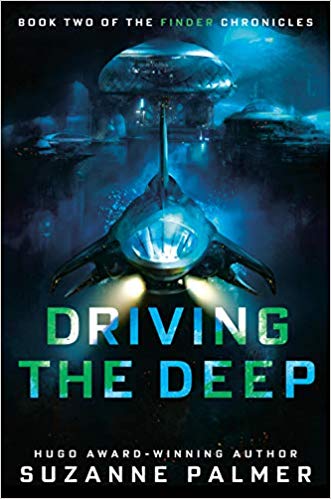 Driving the Deep (Finder Chronicles, #2) by
Driving the Deep (Finder Chronicles, #2) by 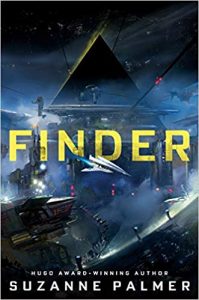 Escape Rating A-: I picked this up because I loved the first book in the
Escape Rating A-: I picked this up because I loved the first book in the 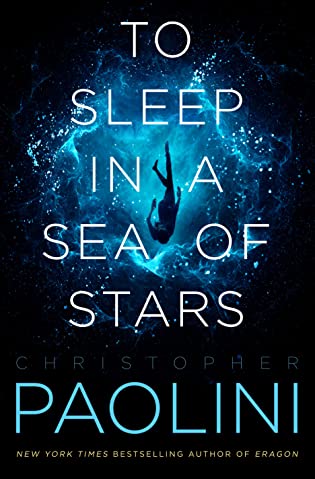 To Sleep in a Sea of Stars by
To Sleep in a Sea of Stars by  ABOUT THE AUTHOR:
ABOUT THE AUTHOR: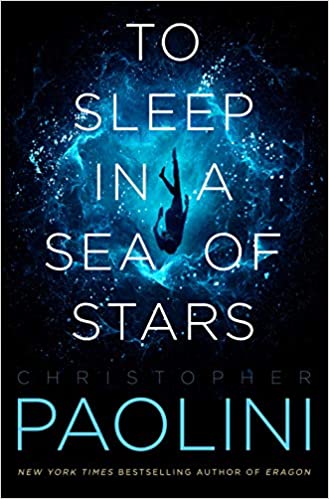 To Sleep in a Sea of Stars by
To Sleep in a Sea of Stars by 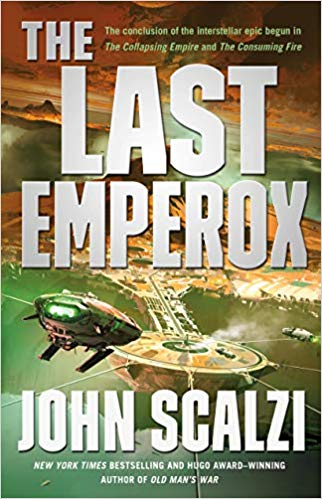 The Last Emperox (The Interdependency, #3) by
The Last Emperox (The Interdependency, #3) by 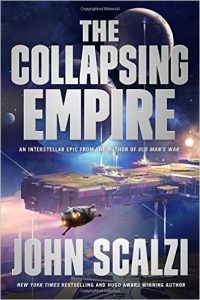 Making it all the more amazing that when this story began, with the writing of the first book in the series,
Making it all the more amazing that when this story began, with the writing of the first book in the series, 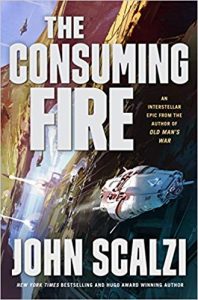 Escape Rating A+: I had a terrible approach/avoidance issue with this book. A part of that was because I had originally intended to listen to it, as I have to the entire rest of the series. The walking profanity explosion that is Kiva Lagos is best appreciated in audio. She just doesn’t have the same impact when reading the book yourself. Also, Wil Wheaton has done a fantastic job with the series, including this entry. But I normally listen while driving, or while on a treadmill at the gym, and everything has been closed. I had more time for reading but fewer opportunities for listening. In the end I mostly played Solitaire and just let the audio wash over me. It was marvelous.
Escape Rating A+: I had a terrible approach/avoidance issue with this book. A part of that was because I had originally intended to listen to it, as I have to the entire rest of the series. The walking profanity explosion that is Kiva Lagos is best appreciated in audio. She just doesn’t have the same impact when reading the book yourself. Also, Wil Wheaton has done a fantastic job with the series, including this entry. But I normally listen while driving, or while on a treadmill at the gym, and everything has been closed. I had more time for reading but fewer opportunities for listening. In the end I mostly played Solitaire and just let the audio wash over me. It was marvelous.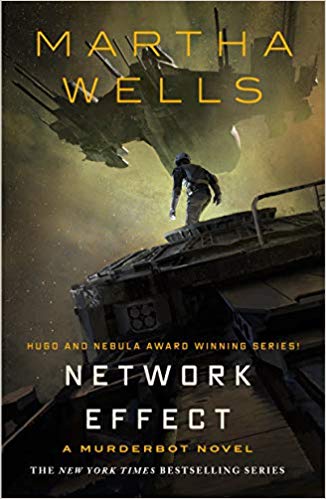 Network Effect (The Murderbot Diaries, #5) by
Network Effect (The Murderbot Diaries, #5) by 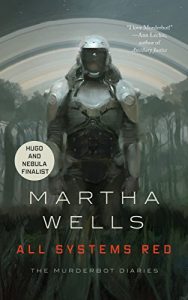 If you are already well acquainted with Murderbot, Network Effect is a fantastic way to get to know it and its world a whole lot better. But if you do not already know Murderbot, this is not the place to get to know Murderbot. That would be
If you are already well acquainted with Murderbot, Network Effect is a fantastic way to get to know it and its world a whole lot better. But if you do not already know Murderbot, this is not the place to get to know Murderbot. That would be 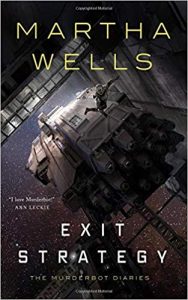 Escape Rating A+: I’ve been waiting for Network Effect for almost two years, and it was well worth the wait. This is one of those reviews where I just want to squee all over the page. This was definitely a one-day read for me. I absolutely could not put it down. At all. Not that I tried very hard.
Escape Rating A+: I’ve been waiting for Network Effect for almost two years, and it was well worth the wait. This is one of those reviews where I just want to squee all over the page. This was definitely a one-day read for me. I absolutely could not put it down. At all. Not that I tried very hard.